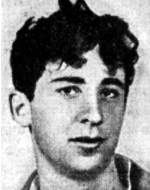Son of Rachel and Shlomo, one of the founders of Ein Harod, was born on 18.8.1929 in Ein Harod. When he was a year and a quarter old, he was a mother. He went through all the stages of education on the kibbutz, from the nursery to the end of the high school when he was 17. He was a healthy, cheerful and playful child. He did not like school, but easily grasped the lessons even without diligently preparing them. He took upon himself work duties and was diligent in fulfilling them despite the difficulties and fatigue. The weak and the elderly were willing to help with their work and their burden, in a gentle manner of social affection, so as not to emphasize a preference for power that could hurt the feelings of the helpers. Was a courageous and sturdy lad, he was not always able to protect children younger than him and was ready and willing to help anyone. He loved sports on most of his branches. He also excelled in the swimming industry, and was one of the first to achieve great achievements in local and regional swimming competitions. His soul was imbued with human values, nationality and status, but not as an artist’s statement of the accepted principles of a society that lived and grew up in it, but as logical conclusions reached in the way of self-thought. Hillel did not spare his criticism of phenomena that he did not see fit, such as cutting down a grove for the purpose of obtaining money (the price of trees), the kibbutz members’ lack of spirit during the agitation of the distribution of the Poalei Eretz Yisrael factions, or handing over a thief, To make a superhuman effort to wipe out the horrors of the horrors and restore them to recuperation, or to employ hired workers 11 hours a day. In his letter to his father who was in Rome, the boy wrote that in the sight of Arch Titus, one should not feel humiliated, but on the contrary, national pride in the face of a monument to Israel’s heroes who stood against the world’s great power. In his Lev proportions, he loved all his knowledge and even the children of an evening gala who were educated in the kibbutz and were given to guide him. Contrary to the disregard for the values of tradition prevalent in the local community, he spoke with appreciation for the values of tradition that were preserved in the audience of elderly parents. He liked the art of the stage and even traveled far away to see a good performance. Among the local youth, he was also known as a central personality, which stimulates cultural and social activities. After completing his studies at the school, he was offered six months to study at the Mapai seminar, but he replied: “As long as I do not enter a permanent job in the agriculture, at least for two years, In the outbreak of the War of Independence after the United Nations General Assembly resolution of 29 November 1947 on the partition of the country into two states, Hillel was recruited on March 19, 1948 for the war effort. Participated with his squad in an attack on the Arabs who had barricaded themselves on the Gilboa and harassed the transportation in the valley. In another class, on the other side, his older brother Yeruvel fought and fell. Hillel went down to see his brother’s body and immediately returned to the battle. After returning from this battle, he demanded that the agriculture be allowed to enlist in a combat unit. When the members extended their deliberations and placed him in charge of the industry, he suspected them of wanting to detain him and told him to flee to the Palmach. Fearful of this, he “plotted” to defect from the course to the front, but to his delight he was sent legally to a commando unit riding on jeeps to the southern front, to the Negev Brigade. On his way to the south, in a brief meeting, he found his Lev-girl again after a few months of severance. As they walked through the Negev, he saw them in his wisdom and his healthy agricultural sense as living spaces and future settlement for the masses of Israel. He was sent to the role of escorting supply convoys to Kfar Darom on the second day of the first truce. According to the experience prior to the dispatch of this convoy, it was necessary to find out before leavingThe truce also applies in this way. The Egyptian opinion was negative, and when the convoy left the village in daylight, they opened fire on it with artillery and machine guns. Hillel was wounded and returned to the village for medical treatment. A few hours later he died of his wounds on 7 June 1948. He was buried in Kfar Darom, and on the anniversary of his death he was put to rest at the Ein Harod cemetery. To his father, who volunteered for the British Army despite being older, and then at the age of 16-17 to his girlfriend. Finally, the letters he wrote to his father during his service in the IDF were collected in a special book published by Kibbutz Ein Harod after they fell, and opened a window to Hillel’s spiritual world. His memory was raised in the book “Sons” issued by the Ein Harod farm in memory of its fallen.
